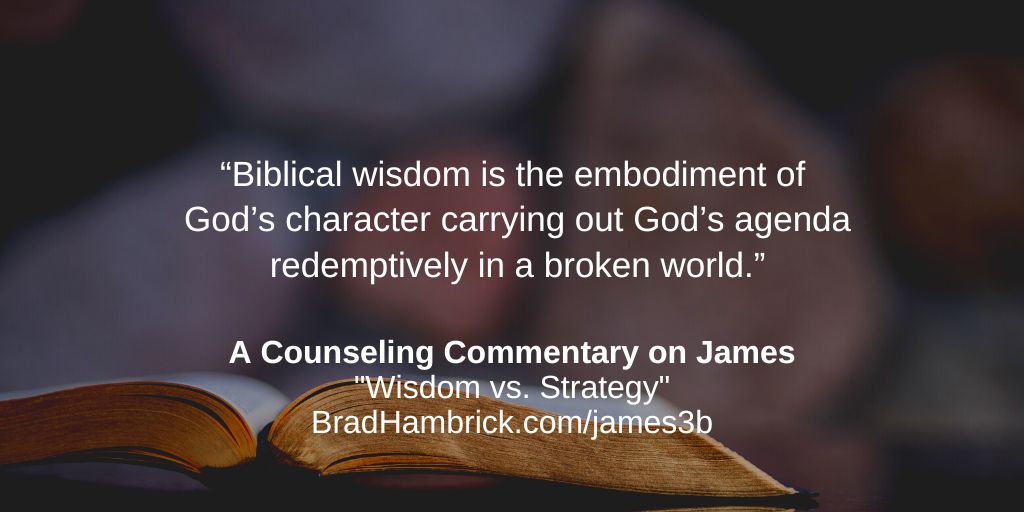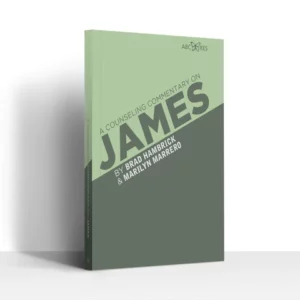Passage – James 3:13-18
13 Who is wise and understanding among you? By his good conduct let him show his works in the meekness of wisdom. 14 But if you have bitter jealousy and selfish ambition in your hearts, do not boast and be false to the truth. 15 This is not the wisdom that comes down from above, but is earthly, unspiritual, demonic. 16 For where jealousy and selfish ambition exist, there will be disorder and every vile practice. 17 But the wisdom from above is first pure, then peaceable, gentle, open to reason, full of mercy and good fruits, impartial and sincere. 18 And a harvest of righteousness is sown in peace by those who make peace.
Commentary
Imagine you’re in a group for overcoming anger. The group facilitator starts your meeting with the question, “Who is the strongest person in the world?” A few people roll their eyes at this hokey ice breaker, but still participate. Some do a quick web search for famous weightlifters and offer a few names. For a laugh, someone guesses Jesus. As a longshot, someone else guesses the current most famous athlete. The group leader doesn’t seem satisfied with any of the answers.
Once no one else has a guess, the leader says, “The person who can control their tongue.” The leader is defining power as the ability to curtail destruction and identifying the tongue as the source of the most life disruption. That is, in effect, what James does in this passage. He is going to redefine a key term: wisdom. In James 1:5, we were asked to pray for wisdom. In these verses, we will learn a lot more about what we should expect to happen within us as God answers our prayer.
What Is Wisdom? (vs. 13)
James starts this section of his letter by asking the question, “Who is wise and understanding among you?” We read this question and begin looking for valedictorians or someone with a Ph.D. James says, “That’s not what I’m talking about.” In effect, James says, “I’m not looking for a high IQ – intelligence quotient. I’m looking for a high CQ – character quotient.”
James defines wisdom as the ability to live in God’s world in a way that represents God accurately. James is going to help us see that the best way to measure biblical wisdom isn’t with a theology quiz but with a character assessment.
The wise person is the one who displays good conduct and meekness – power under control – even in hard times (v. 13). When situations are dicey, the wise person doesn’t acquiesce to a “survival of the fittest and shrewdest” mindset. The biblically wise person maintains a focus being an accurate ambassador of God’s character and agenda for that moment (2 Cor. 5:20).
In might be easy to miss that James is returning to theme that faith must be expressed in tangible actions to be genuine (v. 13). In this case, the “work” of faith is a disposition. Many of us fall into the trap of thinking that being wise is only about having right answers to hard questions and miss, as James is teaching, that wisdom is also about maintaining virtuous character in hard times.
Let’s contextualize this point for the original readers of this letter. They were asked to pray for wisdom (1:5) as they navigated harsh circumstances (1:2) that created intense strife between them (4:1-6). In this context, it wouldn’t be enough for “faith” to be mere positivity, and “wisdom” had to be more than theological accuracy. Unless their faith and wisdom changed their actions and character these believers would continue to flounder in a foreign land and it would be “worthless” (1:26).
What Destroys Wisdom? (v. 14-16)
In these verses, James reinforces the notion that bad character undermines wisdom. James is not saying that people of poor character are stupid; many of them are highly intelligent. But their lack of character takes their intelligence and mutates into cunning or political strategy. In order for intelligence to become wisdom, we must be people of godly character.
James calls bitter jealousy and selfish ambition being “false to the truth” (v. 14). This is an awkward phrase. James is saying more than jealousy and selfishness are wrong. What does it mean to be “false to the truth”? As always, when wrestling with questions like this, it helps us to remember context.
These believers fled persecution in Jerusalem shortly after the resurrection. As such they were simultaneously: (a) the only Christians in their new home, and (b) significantly disadvantaged as they rebuilt their life in a context where they had no social connections. Therefore, every action they took was both: (a) a first impression of Jesus to their unbelieving community, and (b) a desperate attempt to survive.
Evidently, many of their interactions were sinful. James describes their responses as “earthly, unspiritual, demonic” (v. 15). In effect, James is saying, “You fled Jerusalem to uphold the gospel and now you are living in contradiction to the gospel you should be representing… If you were going to live this way, there was no need to flee Jerusalem.”
James is pointing out that not only do their sinful actions displease God, but they also misrepresent God to the surrounding community. They are false (misrepresenting) to the truth (the character of Jesus). The reality that every Christian is an ambassador of the gospel helps us understand this. When an ambassador behaves poorly, it is not just a matter of bad personal character it maligns the country that ambassador represents.
Reading this passage, we should be sympathetic towards these early believers without being permissive towards their actions. Life was hard and their actions were wrong. Wrong actions would make life worse, not better. Love motivated James to confront the “disorder and every vile practice” (v. 16) emerging in their church. This statement foreshadows the severity of conflict in this church (4:1-6). But before he addresses this conflict, he describes the alternative God invites them to embrace.
What Does Wisdom Cultivate? (v. 17-18)
It may catch us off guard that the first (i.e., utmost) quality of biblical wisdom is that it is “pure” (v. 17). We might be prone to think intelligent, cunning, strategic, quick-witted, or decisive. James reminds us that any wisdom that can be trusted must be pure; otherwise, ulterior motives will make that wisdom as much threat as blessing.
After establishing purity as the head from which the river of wisdom flows, James provides a list of other qualities that verify someone’s wisdom is “from above” (v. 17): peaceable, gentle, open to reason, and full of mercy and good fruits. These traits are tangible verifications that someone’s counsel is in line with biblical wisdom.
If someone is contentious, harsh, close-minded, or judgmental, their words – regardless of their intelligence – are not wise. Notice that the last term on this part of the list is full of good fruits. This is often where we start: “Did we get the desired results?” We assume if the answer is yes, then the words were wise and the person speaking had God’s blessing.
Many abusive parents have justified bad parenting with this misstructured logic: “My child quit misbehaving didn’t they?” Many unfit leaders have justified their tactics by making good fruit the primary quality: “The business or church is growing isn’t it?” James refused to put results either first or last (the positions of primacy and emphasis) on this list. Yes, it’s on the list, but its at the back of the middle of the list.
Finally, James concludes verifying qualities of biblical wisdom as “impartial and sincere.” Remember how much and why James had to address partiality with these believers (2:1-13). In a context of oppression, refusing to bias one’s choices to please or appease those with greater social standing is a key indicator that one’s choices (i.e., the expression of wisdom) is “pure” (i.e., the first item on James’ list). Being impartial and sincere reveals that our choices are to please God rather than for personal benefit or from a fear of man.
James concludes this section with a densely worded sentence, “A harvest of righteousness is sown in peace by those who make peace” (v. 18). In this sentence, the prepositions reveal the logic and emphasis.
- “In peace” refers to the character of the person doing the sowing.
- “By those” refers to the action of embodying wisdom.
- “Make peace” refers to the results or fruits of our choices.
The farming metaphor embedded in this final sentence is very apropos for James’ readers. There is a long delay between sowing and reaping. James is not proposing a quick-fix solution. But in this common metaphor, James is making a striking statement: the character of the farmer impacts the fruit of the seed. There is a warning even in this word of encouragement: an ill-motived farmer can disrupt a harvest of righteousness from good seed.
We all know this. We’ve seen it. Maybe you’ve lived it. A Christian who is marked by self-interest, ambition, and partiality teaches God’s Word accurately (different from faithfully, which entails the character of the teacher, not just the orthodoxy of his words), grows a church, and then damages the faith of those under his teaching. An ill-motive teacher produces a harvest of disillusionment rather than confusion. James fears that happening in this church, so he turns his attention to how they engage conflict next (James 4:1-10).
Conclusion
We should be humbled by this portrayal of wisdom. This is not an approach to wisdom that can be memorized like a list or mastered like a set of inter-related concepts. Wisdom is not a mere matching quiz between biblical principles and life situations. Biblical wisdom is the embodiment of God’s character carrying out God’s agenda redemptively in a broken world.
Biblical wisdom is the embodiment of God’s character carrying out God’s agenda redemptively in a broken world. Share on XIntelligence is no big advantage to obtaining this kind of wisdom. It is as accessible to the simple as it is the brilliant. The power of this wisdom can be unleashed by the poor as much as it can the rich, by those with little social influence as much as the social elites.
That was a source of great hope for James’ first readers. Trying to navigate daily life in their second language, they often felt dumb. Not having financial means or social influence, they often felt powerful. James’ call to wisdom – while it contained a rebuke – was also an affirmation: in Christ, they had everything they needed to change the world with a harvest of righteousness.
Questions
- Before reading this section of James, how would you have defined wisdom and power?
- After reading this passage, how would you describe the relationship between character and wisdom?
- It what ways does bad character distort the impact of being wise?
- How does viewing yourself as God’s ambassador give added weight to the warning against being “false to the truth”?
- What are examples of when you’ve wrongly used obtaining a desired outcome to justify something as wise that distorted by selfish motives?
- Based on this definition, “Biblical wisdom is the embodiment of God’s character carrying out God’s agenda redemptively in a broken world,” what should wisdom look like in your life this week?
* * * This article is part of a series entitled A Counseling Commentary on James.
* * * If you enjoyed this article, you may also be interested in my series A Counseling Commentary on Philippians.

